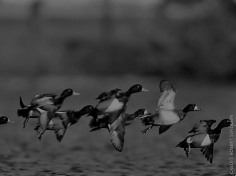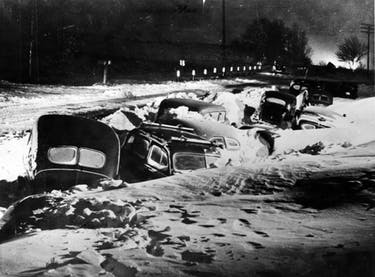|
ARMISTICE DAY / VETERAN'S DAY - NOVEMBER 11, 1940 The morning was dark and cold. Leech Lake in north central Minnesota beckoned the duck hunters to climb into their boats and head for the blinds. My father, John Edward Welk (aka Punchy) was no exception. He and my Uncle Iver loaded their boat with plenty of hot coffee, guns, shells and decoys. They headed toward Bear Island and Jensen's point. Here was the perfect landing spot for the mallards and bluebills as they made their yearly journey. Leech Lake was turbulent but that did not deter these hunters. With motors and a full tank of gas, they left the dock and began their trek to the duck blinds. Soon after setting out the decoys and getting the boat into position, the ducks began to fly. Wow, the weather was getting bad, but the hunting was excellent. My father and uncle filled their limits in a very short time. My father was always concerned about weather. He often told the story of riding out a tornado in North Dakota. Back then, he was working on the railroad when a tornado hit the ground. He said he hung onto the rails of a boxcar. The wind was very violent, knocking his head against the boxcar. He thought at any moment that he would be knocked unconscious or be torn loose from the rail. Luckily, John Welk was a very strong man, so was able to endure the pressure. But for the rest of my father’s life, he always watched the skies for signs of bad weather. When the rains, thunder and lightning started, we were all instructed to stay away from the windows and the sink, lest the lightning would strike us. Especially winter with its wind, snow, and cold had many warnings from my father. “Never dig a tunnel in the snow”, “never stand still when it is cold - keep moving”, “always wear a hat - it keeps you warm”, “never go outside with a wet head - you’ll get sick” and many more warnings. On this cold November day in 1940, Dad read the weather, and he was very concerned that it was becoming very bad in a very short time. My father suggested they return home but Uncle Iver did not feel that it was that bad. So slowly, my father and my uncle headed the boat towards home. By the time they reached the dock, the weather was now an extremely strong storm; the waves were beating up the boat and the dock. Finally, the two men were able to tie the boat to the dock. Quickly they removed the ducks, thermoses and decoys. The guns were put in the bow of the boat. All of a sudden, the boat began to rock due to a forceful wave, and the guns fell against the boat seat. The hammer of one of the guns, a 12-gauge double barrel shot gun, (manufactured at the turn of the century), hit the seat and accidentally discharged. It caught my father in his right arm, splitting it wide open. Dad was rushed to the house. Uncle Iver called for help, and neighbors administered what they knew about first aid. They loaded my father in a car and headed for the hospital. It was over 60 miles to the nearest hospital, and unfortunately he was bleeding profusely. This all happened during the worst storm of the century. It was referred to as the "Storm from Hell". Without any warning (remember what communications were like in 1940), this storm quickly dumped several inches of snow, dropped the temperature several degrees to sub-zero levels, and delivered extremely strong winds all over the Midwest. The storm knocked out power and killed thousands of animals and hundreds of humans. Those who were traveling lost their way in the blinding snow and simply froze to death. Off in the blinding snowstorm they struggled with my severely injured father. They stopped just a short distance from Walker, Minnesota at the state hospital, Ah-Gwah-Ching, and my father received more first aid. Then on to St. Joseph Hospital in Park Rapids they headed. St. Joseph was run by nuns as were many of the hospitals in northern Minnesota. My father was on the verge of passing out when a nun grabbed him by the hair and told him he was strong. "So sit up, you will be fine.” He would tell us if he hadn't been so weak, he would have punched her. (Remember his nickname is Punchy.) Here my Dad would remain for several days. The nurses ground liver and made him drink it to replace the blood that he had lost. I am sure he received good care but knowing my father, he would not stay there any longer than necessary. He was a very stubborn German. I often think of what went through my Mother's mind. My sister, Marilyn, was about 2 years old, I was 3 months old and Mother was pregnant with my sister, Charlotte. Now there goes her wounded husband to the far off hospital. She could not go with him, would she ever see him again, and how would she care for three small children by herself? Wow! What a load. But the stubborn German healed and went on to father five more children. One evening he stopped talking, and with a strange look in his eye, he opened his mouth and showed us a BB that had migrated to his check. On another occasion, he took a knife and cut his arm to release a BB that had surfaced. Father said 96 BBs were still in his arm. His hand was crippled, having no use of his fingers. Why did one of these BBs not go to his heart or lungs? Sometimes because his fingers were so close to his hand, it would become irritated and salve would be rubbed into that spot. I don't remember of him ever complaining or considering himself handicapped. He was a logger and used a chain saw; he worked road construction, and he did many other jobs to provide for his big family. My parents provided for us without the help of food stamps or commodities. We had a small farm where we raised enough animals for our use, we had a large garden, and we picked every berry we possibly could. They were hard working farmers and planned for the long winters by canning and smoking meat and raising their own food. We never went hungry. We were poor, but we didn't know it. We had a lot of good food, the fellowship of the community and the love of a big family. We were truly blessed. |
Gwen Welk Workman, November 11, 2014 |
Armistice Day/Veteran's Day, November 11, 1940
August 12th 2020 - Writings



Comments